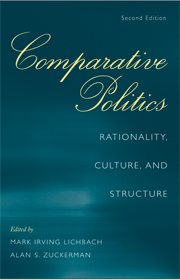Crossref Citations
This Book has been
cited by the following publications. This list is generated based on data provided by Crossref.
Gazibo, Mamoudou
and
Jenson, Jane
2007.
Penser l'international.
p.
87.
Étienne, Sauveur Pierre
2007.
L’énigme haïtienne.
p.
343.
2010.
Post-Imperial Democracies.
p.
3.
Hague, Rod
and
Harrop, Martin
2010.
Comparative Government and Politics.
p.
76.
Baldez, Lisa
2010.
The Gender Lacuna in Comparative Politics.
Perspectives on Politics,
Vol. 8,
Issue. 1,
p.
199.
Neff, Christopher
2012.
Australian Beach Safety and the Politics of Shark Attacks.
Coastal Management,
Vol. 40,
Issue. 1,
p.
88.
Saez, Lawrence
2013.
Methods in Governance Research: A Review of Research Approaches.
SSRN Electronic Journal,
Salman, Aneela
2015.
Green houses for terrorism: measuring the impact of gender equality attitudes and outcomes as deterrents of terrorism.
International Journal of Comparative and Applied Criminal Justice,
Vol. 39,
Issue. 4,
p.
281.
Checkel, Jeffrey
Friedman, Jeffrey
Matthijs, Matthias
and
Smith, Rogers
2016.
Roundtable on Ideational Turns in the Four Subdisciplines of Political Science.
Critical Review,
Vol. 28,
Issue. 2,
p.
171.
2016.
Comparative Government and Politics.
2016.
Rebelocracy.
p.
403.
André, Audrey
and
Depauw, Sam
2017.
Too much choice, too little impact: a multilevel analysis of the contextual determinants of preference voting.
West European Politics,
Vol. 40,
Issue. 3,
p.
598.
Sanborn, Howard
and
Ramirez, Jenny
2017.
Reflections on Asia: Borrowing Lessons from the Humanities in Social
Science Coursework.
ASIANetwork Exchange: A Journal for Asian Studies in the Liberal Arts,
Vol. 24,
Issue. 2,
p.
70.
Burkhardt, Fabian
2017.
The institutionalization of relative advantage: formal institutions, subconstitutional presidential powers, and the rise of authoritarian politics in Russia, 1994–2012.
Post-Soviet Affairs,
Vol. 33,
Issue. 6,
p.
472.
Weyland, Kurt
2017.
Autocratic diffusion and cooperation: the impact of interests vs. ideology.
Democratization,
Vol. 24,
Issue. 7,
p.
1235.
2017.
Conservative Parties and the Birth of Modern Democracy in Europe.
p.
428.
Kotler-Berkowitz, Laurence
2017.
The Structure of Political Divisions Among American Jews.
Contemporary Jewry,
Vol. 37,
Issue. 1,
p.
5.
2017.
Forbearance as Redistribution.
p.
381.
Duyvesteyn, Isabelle
2017.
Rebels & Legitimacy; An Introduction.
Small Wars & Insurgencies,
Vol. 28,
Issue. 4-5,
p.
669.
Basta, Karlo
2018.
The Social Construction of Transformative Political Events.
Comparative Political Studies,
Vol. 51,
Issue. 10,
p.
1243.



